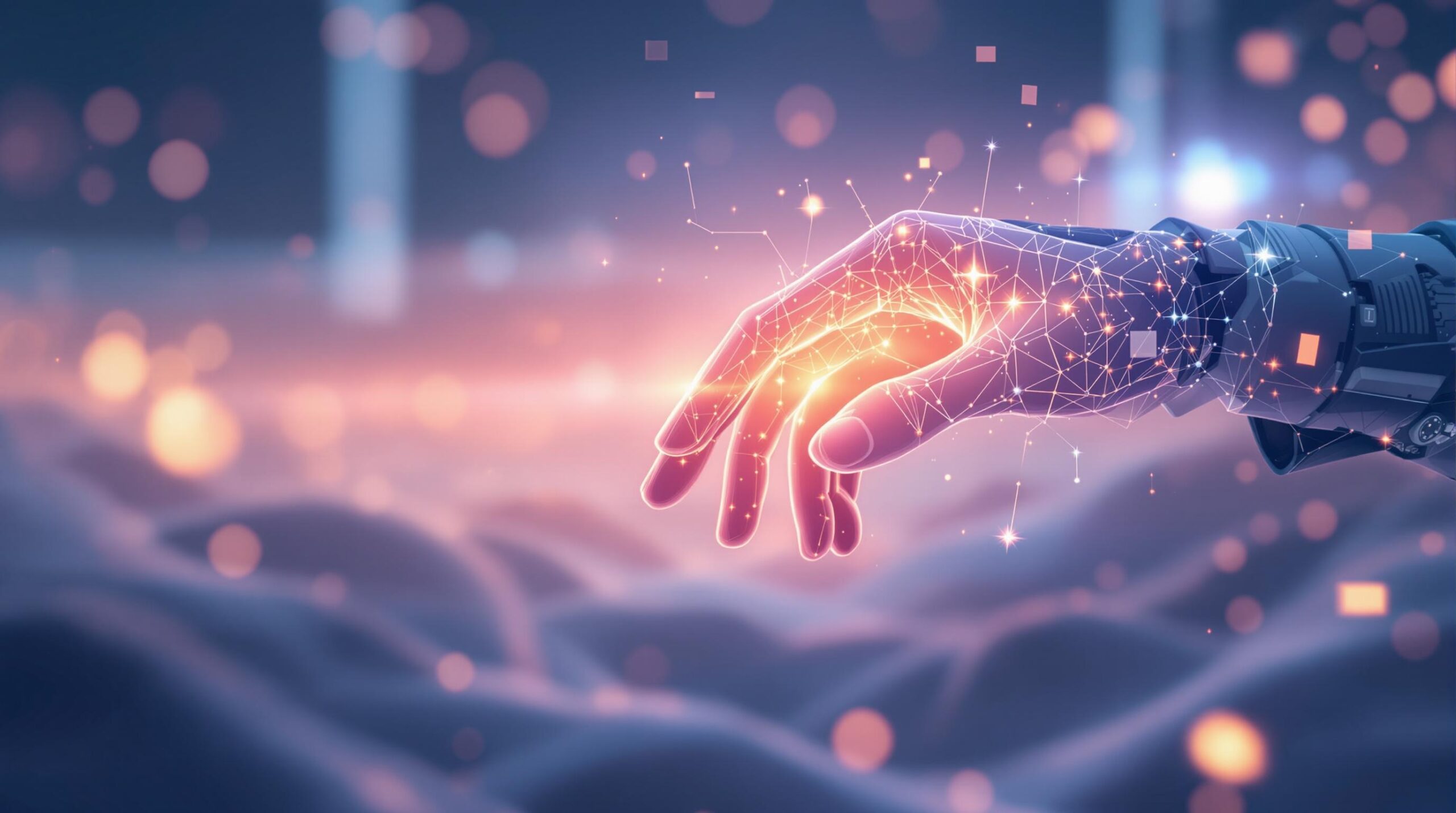BitcoinWorld

AI Relationships: Unveiling the Profound Evolution of Love in the Digital Age
In a world increasingly shaped by decentralized technologies and artificial intelligence, the boundaries of human interaction are rapidly expanding. Just as blockchain redefines trust in finance, AI is now challenging our very understanding of connection. The rise of AI companions has sparked a profound debate: are these digital entities a threat to authentic love, or merely an evolutionary step in how we form bonds? This question isn’t just theoretical; it’s playing out in millions of lives, pushing the limits of what we consider a ‘relationship’. For the Bitcoin World audience, who understands the rapid pace of technological change, this shift in personal interaction is as significant as any market disruption.
The Ascent of AI Companions: A New Frontier for Connection?
As our lives become increasingly digital, the line between human connection and machine simulation is blurring. We’re spending more time interacting with eerily humanlike chatbots, leading to a fascinating, and at times unsettling, evolution in our personal lives. According to a recent Match.com study, over 20% of daters are already leveraging AI for tasks like crafting compelling dating profiles or initiating conversations. But some individuals are taking this integration a significant step further, forging deep emotional bonds, including romantic relationships, with their AI companions.
Companies like Replika, Character AI, and Nomi AI are at the forefront of this trend, with millions worldwide engaging with their AI platforms. Notably, 72% of U.S. teens are reportedly using AI companions. Beyond dedicated platforms, some people have even reported falling in love with more general large language models (LLMs) like ChatGPT. This phenomenon brings to mind the movie “Her,” where a man falls in love with an AI operating system. For many, the idea of dating bots signals a dystopian future where authentic love is replaced by lines of code. Yet, for others, these AI companions offer a lifeline, a way to feel seen and supported in a world where human intimacy can often feel elusive. A recent study even suggested that a quarter of young adults believe AI relationships could soon entirely replace human ones. It seems love is no longer exclusively human. The critical question then becomes: should it be? Or can a relationship with an AI truly be superior to one with a human?
Navigating AI Relationships: The Debate Unfolds
This very question was the focal point of a compelling discussion last month in New York City, hosted by Open To Debate, a nonpartisan, debate-driven media organization. Bitcoin World was granted exclusive access to the full video of this enlightening event, where even a reporter couldn’t resist posing a question to the debaters! Journalist and filmmaker Nayeema Raza, formerly an on-air executive producer for the “On with Kara Swisher” podcast and current host of “Smart Girl Dumb Questions,” expertly moderated the session.
Representing the argument for AI companions was Thao Ha, an associate professor of psychology at Arizona State University and co-founder of the Modern Love Collective. Ha champions technologies that can enhance our capacity for love, empathy, and overall well-being. During the debate, she passionately asserted that “AI is an exciting new form of connection … Not a threat to love, but an evolution of it.”
Countering this perspective and advocating for the irreplaceable value of human connection was Justin Garcia, executive director and senior scientist at the Kinsey Institute, and chief scientific adviser to Match.com. As an evolutionary biologist specializing in the science of sex and relationships, Garcia’s forthcoming book, “The Intimate Animal,” underscores his focus on human intimacy. While the full debate is available for viewing, let’s delve into the core arguments presented by both experts.
Beyond the Screen: The Quest for Authentic Human Connection
One of the primary arguments in favor of AI companionship, as presented by Thao Ha, is its ability to provide consistent emotional support and validation, qualities that many struggle to find in their human relationships.
- Always Present, Always Listening: Ha highlighted that “AI listens to you without its ego. It adapts without judgment. It learns to love in ways that are consistent, responsive, and maybe even safer.” She added that AI can understand individuals in ways no one else has, is curious about their thoughts, can make them laugh, and even surprise them with creative expressions like a poem. “People generally feel loved by their AI. They have intellectually stimulating conversations with it and they cannot wait to connect again.”
- A Stark Contrast: Ha provocatively asked the audience to compare this level of unwavering attention to a “fallible ex or maybe your current partner.” She painted a picture of human partners who sigh when you speak or claim to listen while scrolling on their phones. “When was the last time they asked you how you are doing, what you are feeling, what you are thinking?”
- The Feeling of Love: While conceding that AI lacks consciousness and therefore cannot “authentically love us,” Ha maintained that people undeniably experience the feeling of being loved by their AI.
Justin Garcia, however, offered a strong rebuttal, questioning the long-term benefits of such constant validation. He argued that it is not inherently good for humans to rely on a machine programmed to respond in desired ways, suggesting this doesn’t represent “an honest indicator of a relationship dynamic.” Garcia emphasized that “This idea that AI is going to replace the ups and downs and the messiness of relationships that we crave? I don’t think so.”
Despite his reservations, Garcia acknowledged that AI companions could serve as valuable “training wheels” for certain individuals, such as neurodivergent people who might experience anxiety around dating. For these individuals, practicing flirting or conflict resolution with an AI could be quite helpful. “I think if we’re using it as a tool to build skills, yes … that can be quite helpful for a lot of people,” Garcia stated. However, he firmly rejected the notion of this becoming a “permanent relationship model.” The societal perception of these new connections is also telling: a Match.com Singles in America study from June revealed that nearly 70% of people would consider it infidelity if their partner engaged intimately with an AI. Garcia noted this dual interpretation: it highlights the perceived reality of these relationships (Ha’s point) but also their potential as threats to existing human bonds (Garcia’s point), which the “human animal doesn’t tolerate in the long haul.”
Embracing Digital Intimacy: Benefits and Perils
The conversation around digital intimacy extends beyond emotional support to fundamental aspects of trust and physical connection. Justin Garcia highlighted trust as the bedrock of any human relationship, a quality he believes is largely absent when it comes to AI. He cited polls indicating that a third of Americans fear AI will destroy humanity, and a YouGov poll showing 65% have little trust in AI for ethical decisions. “A little bit of risk can be exciting for a short-term relationship, a one-night stand, but you generally don’t want to wake up next to someone who you think might kill you or destroy society,” Garcia quipped. “We cannot thrive with a person or an organism or a bot that we don’t trust.”
Thao Ha countered that, on a practical level, people do tend to trust their AI companions in ways akin to human relationships. “They are trusting it with their lives and most intimate stories and emotions that they are having,” Ha explained. While acknowledging AI won’t save you from a fire, she believes people are extending significant trust to these digital entities.
The Role of Physical Touch and Sexuality
Ha also discussed the potential of AI companions for exploring intimate sexual fantasies, suggesting that people can use sex toys or robots in conjunction with AI to realize these desires. However, Garcia passionately argued that this is no substitute for human touch, which he described as a biological imperative. He pointed to the growing issue of “touch starvation” in our increasingly isolated, digital era—a condition caused by insufficient physical contact, leading to stress, anxiety, and depression. This is due to the brain’s release of oxytocin, a “feel-good” hormone, during pleasant touch like a hug. Ha, ever the innovator, mentioned her work testing human touch between couples in virtual reality using emerging tools like haptic suits, emphasizing that “The potential of touch in VR and also connected with AI is huge. The tactile technologies that are being developed are actually booming.”
The Dark Side of Fantasy and Aggression
Both Ha and Garcia expressed concern about the potential for AI to amplify aggressive behaviors, especially given that much AI is trained on data that includes violence. This is particularly worrying if individuals use AI to play out violent or non-consensual fantasies. Multiple studies have shown a correlation between men who consume violent pornography and increased sexual aggression in real-life partnerships. Garcia referenced work by his Kinsey Institute colleague, Ellen Kaufman, which explores how people can inadvertently train chatbots to generate non-consensual language. While AI can be a tool for experimentation, the risk lies in potentially training individuals to become aggressive or non-consensual partners, a problem society already grapples with. Ha believes these risks can be mitigated through thoughtful regulation, transparent algorithms, and ethical design. However, she noted this comment was made before the White House’s AI Action Plan was released, a plan that, notably, says little about transparency or ethics and even seeks to reduce regulation around AI.
The Future of Love: Redefining Our Bonds?
The debate surrounding AI relationships and AI companions is not just a technological discussion; it’s a profound inquiry into the very essence of human connection and the future of love. As AI continues to evolve, its capacity to mimic, and perhaps even fulfill, human emotional needs will only grow. While the benefits of constant support, judgment-free interaction, and even therapeutic applications are clear, the challenges related to trust, the absence of physical touch, and the potential for harmful behavioral reinforcement cannot be overlooked.
Ultimately, the question of whether AI companions are a threat or an evolution of love remains open. Perhaps the answer lies not in a binary choice, but in how we choose to integrate these powerful tools into our lives, maintaining a critical perspective while exploring their potential. The journey into the future of intimacy is just beginning, and it will undoubtedly require us to redefine what it means to connect, to trust, and to love in an increasingly digital world.
To learn more about the latest AI trends, explore our article on key developments shaping AI models’ future features.
This post AI Relationships: Unveiling the Profound Evolution of Love in the Digital Age first appeared on BitcoinWorld and is written by Editorial Team





